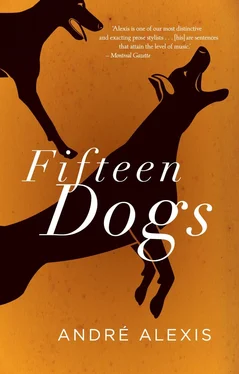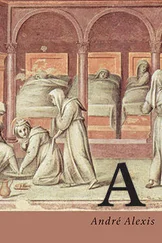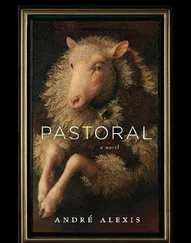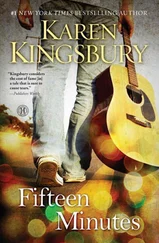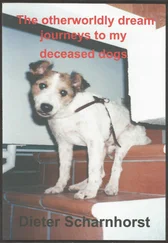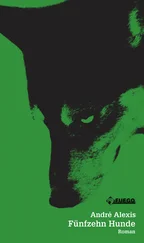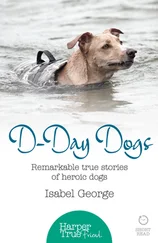From there — south of Dundas and Manning — he was abducted. That is, he was lured into a vehicle driven by adults but filled with young humans. He ended up somewhere far north of the lake: off Avenue Road, south of Eglinton. Prince was, fundamentally, good-natured. He was curious about the world and all that was in it, but here the younger humans would not let him alone. There was always some child — breath smelling of sugar and summer berries — draped around his neck like a kerchief of monkey. Despite this, he would have stayed on. In most ways, the humans were kind. The one way in which they were not, however, was in the leash they chose for him. It was a choke chain that he could not look at without feeling trepidation.
Most of the leash was black leather. The leather had a clip that fastened onto a metal ring. The metal ring was attached to a silver chain made of metal links that was itself fastened to a metal ring. Once around his neck, the silver chain either hung loosely or, when pulled, constricted and strangled him. This was not only unpleasant in itself, but, when he was occasionally attacked by other dogs, he had to choose between strangulation (as the human tried to hold him back) or defence. That is, he was either bitten or choked. This turned walking with the humans into a daily source of anxiety. And so, feeling that he would go strange if he stayed, Prince opened the front door for himself one night and wandered off.
After Avenue and St. Clair, he again drifted east, going from this plate of food to that treat, staying sometimes in people’s yards, scavenging for food in back alleys and behind restaurants. Moving across the city while sniffing out the lake, which was, when the wind was right, like a tantalizing hint of mineral and algae, a hint quickly lost in the congeries of city smells.
Having moved across Toronto in a rough parabola (from High Park not far from the lake north to Eglinton then south and east to the Beach below Victoria Park and Queen), Prince would have been hard-pressed to say what the city was. Not its dimensions — which did not interest him — but its essence. Certainly, it had a particular heft in the mind. It was different from Ralston, where he’d been whelped and where his first and still-beloved master had lived. Ralston was ‘home.’ It was an ache within him and always would be.
Toronto was, above all, a place for humans, their warm dens and unpredictable moods. It reeked of them: from the pleasing musk of their genitals and arses to the sweet, compound fragrances that clung to them. They were the city’s hazard and its sanctuary, its sense and its point. But what Prince loved about the city, the reason it was the setting for most of his poems, was the way it smelled. Whatever else he might be feeling or thinking, there was always some distracting smell to consider: humans, of course, but so much more, from the rotting carcasses of small animals around Grenadier Pond to the mouth-watering emanations from curry houses around Danforth and Victoria Park. A dog would have to be dead not to appreciate the sheer variety of the city’s reeks.
At this point, bored by Prince’s account of his travels, Benjy said
— Yes, yes, but where do you sleep and what do you eat?
— I do not sleep in any one place, said Prince. I know of a number of dens where the humans feed me and let me stay inside.
— Are these dens nearby? asked Benjy. I am hungry.
— One is near, said Prince. Shall I take you?
— Will the humans feed me?
Prince thought about it for a moment. He’d never brought another dog with him to any of the places he knew, but then he had never encountered one of his pack mates out here by the lake. One of his pack mates? The last one and, so, the most important, worth more to him than all the humans together.
— I do not know why they would not feed you, he said.
And he led Benjy on a longish trek to a house near Rhodes and Gerrard.
The house in question was small and rickety, looking a little like it might tip over. It was white (or whitish), its porch trimmed in a grandmotherly blue. Though it was late afternoon, Prince said
— They are not awake this early. We will have to wait.
Which they did, lying side by side on the porch. As they waited, Prince recounted more of his time away from the pack, his impressions of the city, interrupting his narrative to speak one of his newer poems:
With one paw, trying
the edges of the winter pond,
finding its waters solid,
he advances, nails sliding,
still far from home.
While listening to Prince, Benjy experienced a feeling he rarely felt: boredom. He knew no word for boredom, but the feeling was accompanied by a nearly palpable desire to have Prince stop talking. It was not that Prince was in the least offensive. It was that nothing the dog said was of use to Benjy. Besides, he hated the trouble it took to understand some of the words. He felt relief when the screen door screeched and a human stepped onto the porch. It was a man, tall and imposing, his hair black.
He lit a cigarette and then, seeing the dogs, he called out:
— Clare! Your dog brought a friend!
Then dimly, from inside the house:
— What?
— Your dog! It brought another dog with it!
The screen door screeched again and out stepped a short woman in a pink terrycloth robe: hair as dark as the man’s, eyes outlined in kohl. She took a drag on the man’s cigarette, then reached down to pat Prince’s back.
— Hi, Russell, she said. Hi, boy! Where you been?
Prince flinched at her touch, a ripple travelling along his flanks.
— You see that? said the man. He’s got fleas.
— He doesn’t have fleas! Leave him alone!
Having so recently observed a human couple ‘up close’ and having spent time learning the rudiments of their language, Benjy assumed he understood the dynamic between the humans before him. More: he saw an opportunity to make a place for himself. So, when the female had finished asserting that Prince had no fleas, Benjy suddenly got up on his hind legs, put his front paws together as if he were praying and recited the beginning of Vanity Fair :
— Eye’ll tuh pro-sent sendry wass een eets teens an un-shy-nee ore-ning een June …
That was as far as Benjy got before he blanked, but he had made an impression. Though they had trouble with the dog’s accent, the couple recognized the rhythms of speech. They looked at Benjy in wonder, as if he were an impossibility. A good ten seconds passed before the man said
— What in the fuck was that?
— I don’t know, said Clare. Is he talking?
Suddenly and with unexpected grace, the man picked Benjy up by the scruff of the neck and, with Benjy’s snout near his own nose, asked
— Do you talk?
Benjy could, of course, in his limited way, talk. What he could not do was speak while his neck was learning the weight of his arse. He struggled in the man’s grip, increasingly uncomfortable, managing only a kind of half-bark, half-plea.
— Put him down, said Clare. How’s he going to talk if you’re strangling him?
— This is how dogs are supposed to be picked up, said the man.
But he put Benjy down.
Prince, who’d jumped off the porch, called to his pack mate.
— Let’s go, he said. The big human is not always good.
But Benjy sat at the man’s feet, tail wagging expectantly.
— You see? said the man. I didn’t hurt him.
— Yeah, but you scared Russell, said Clare.
— Who cares? asked the man. I bet this one does tricks.
To Benjy, he said
— Roll over!
Which Benjy did.
— Play dead! the man said.
Which Benjy did.
— Dance!
Which Benjy did, getting up on his hind legs and turning in neat circles.
Читать дальше
